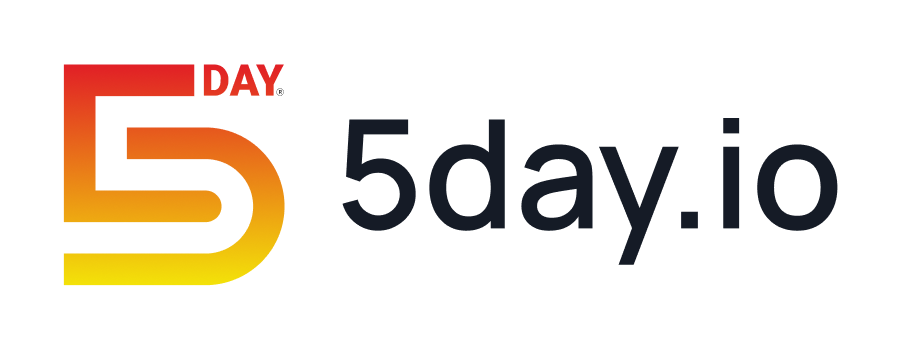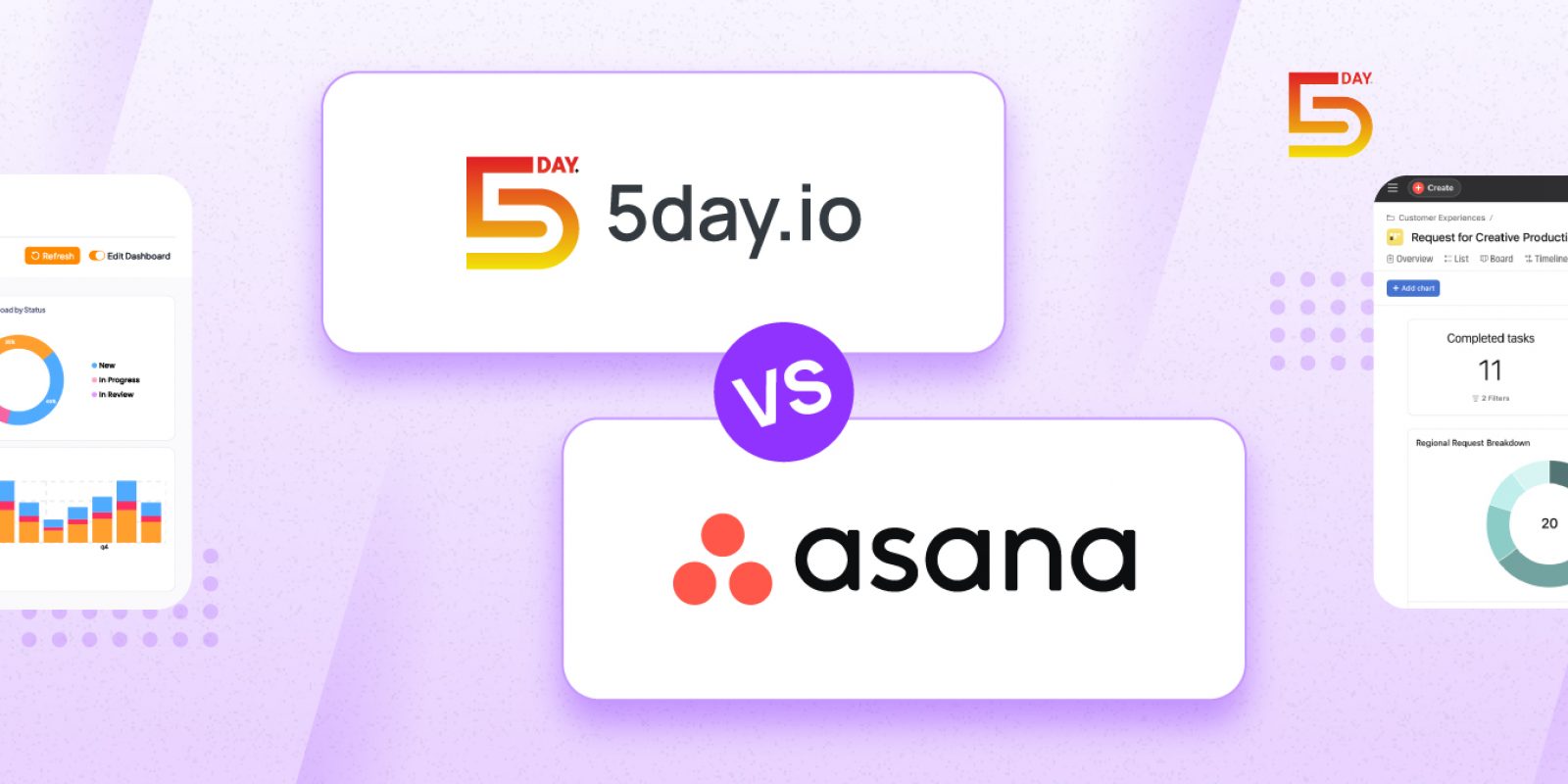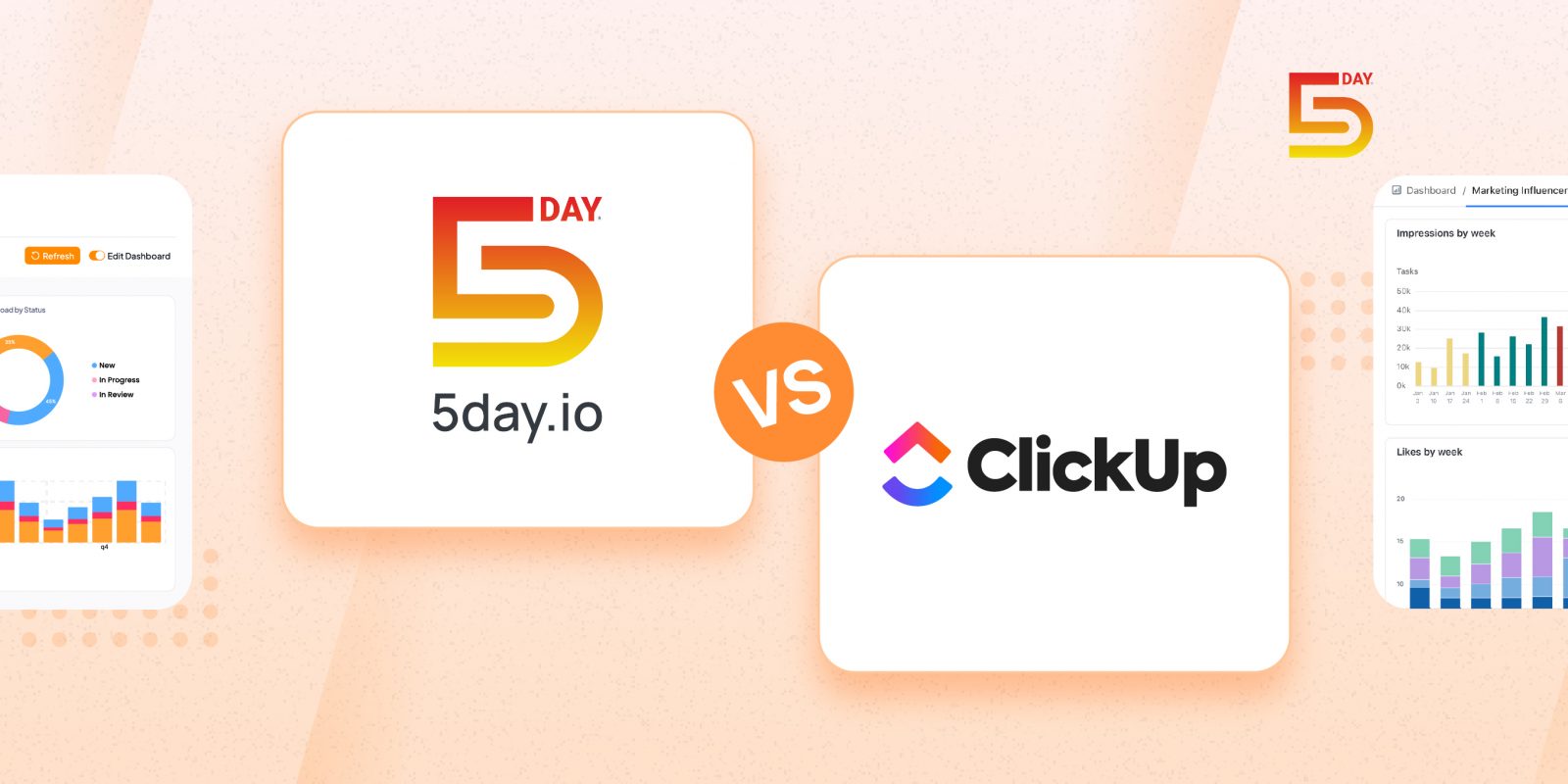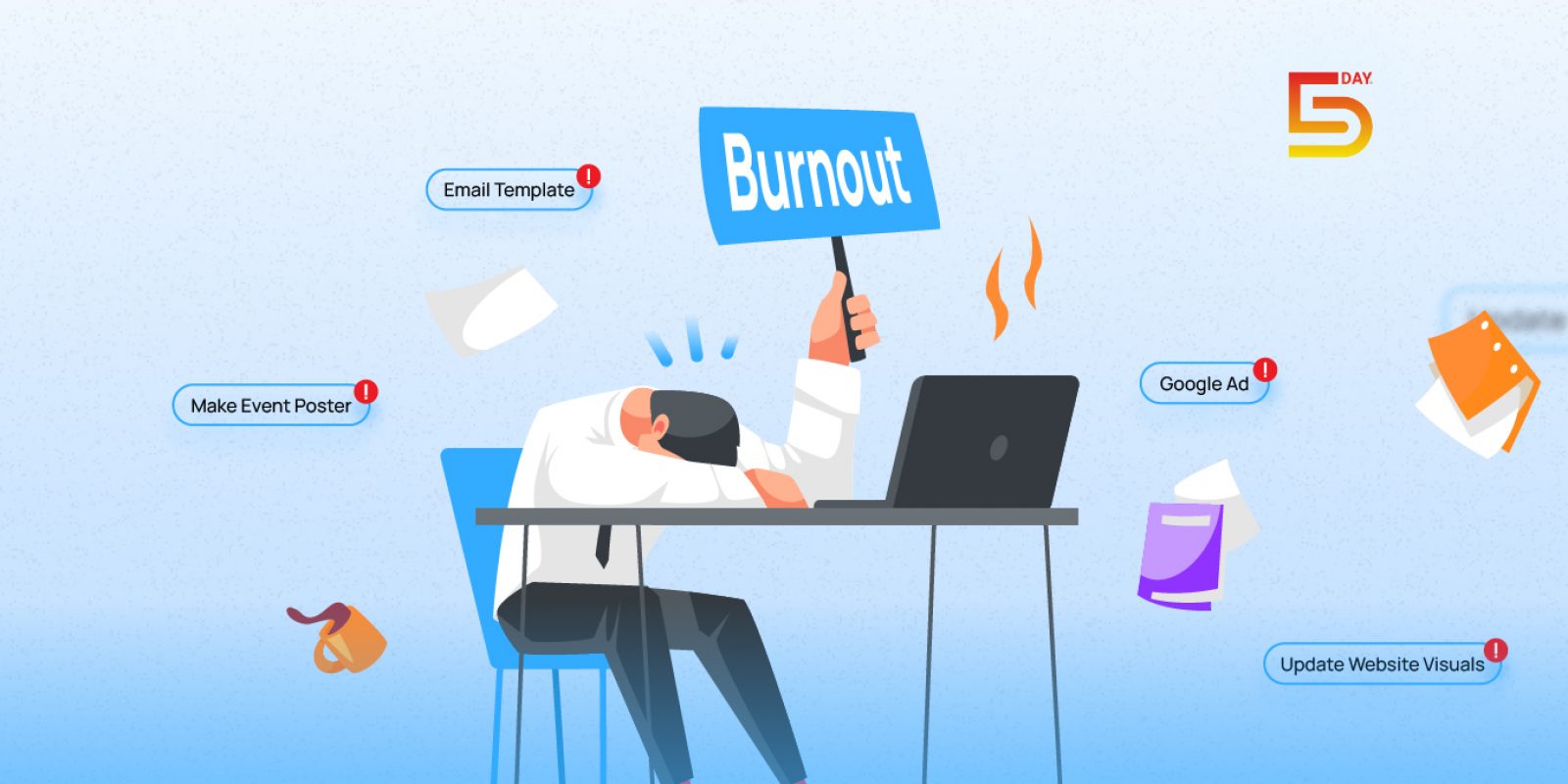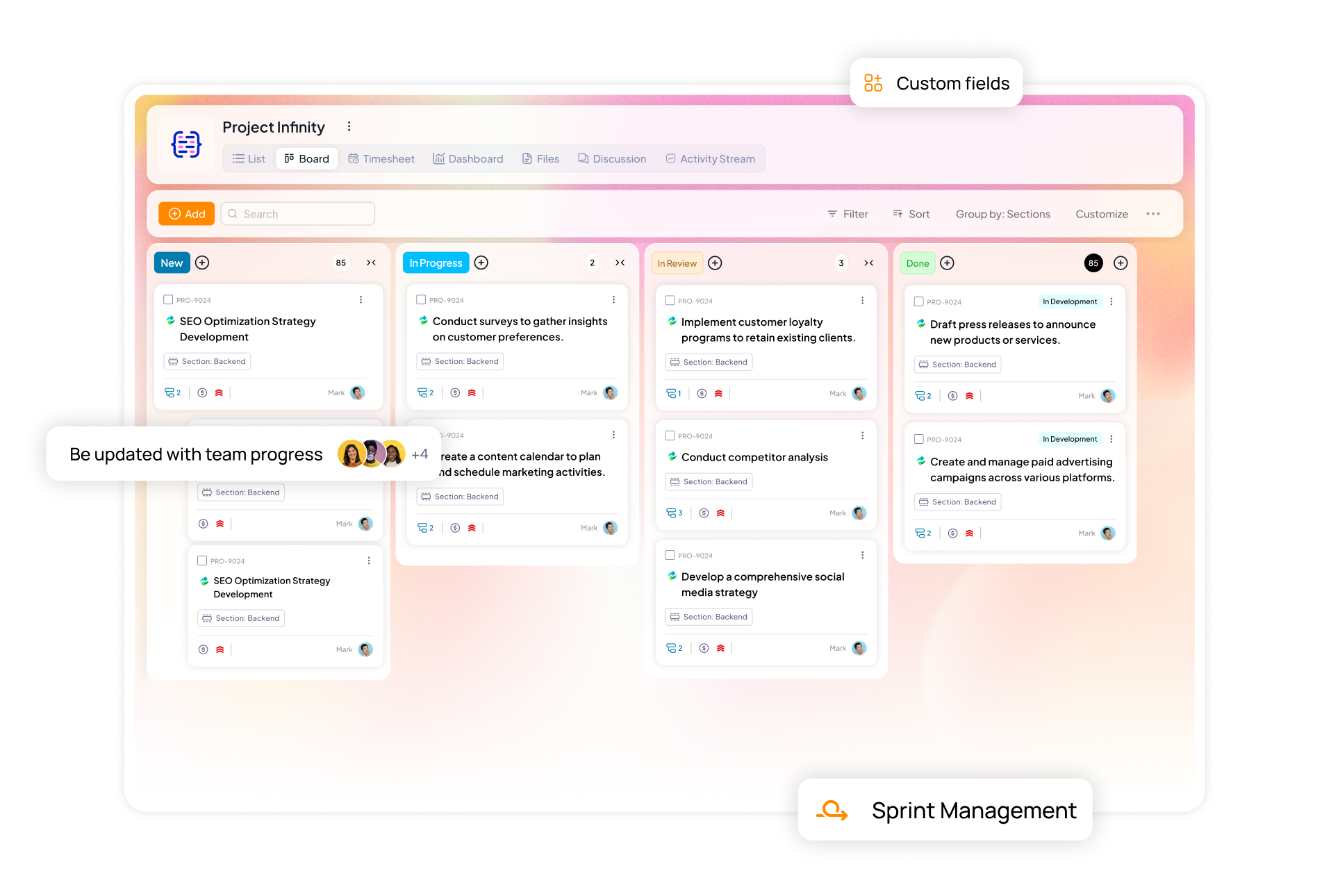Content production, the lifeblood of modern marketing, is riddled with inefficiencies. Teams face a scattered process, with disconnected briefs, endless feedback loops, version chaos, delayed approvals, and unpredictable publishing timelines.
5day.io unites everyone and everything in one workflow, so marketing leaders turn content operations from a chain of bottlenecks to a business advantage.
This article details how 5day.io can help teams reach publication from brief with as little friction as possible. First, we will walk through some challenges at each stage of content production and then how 5day.io solves it.
The content production process and hinderances at each stage
The journey of content production typically follows seven stages.
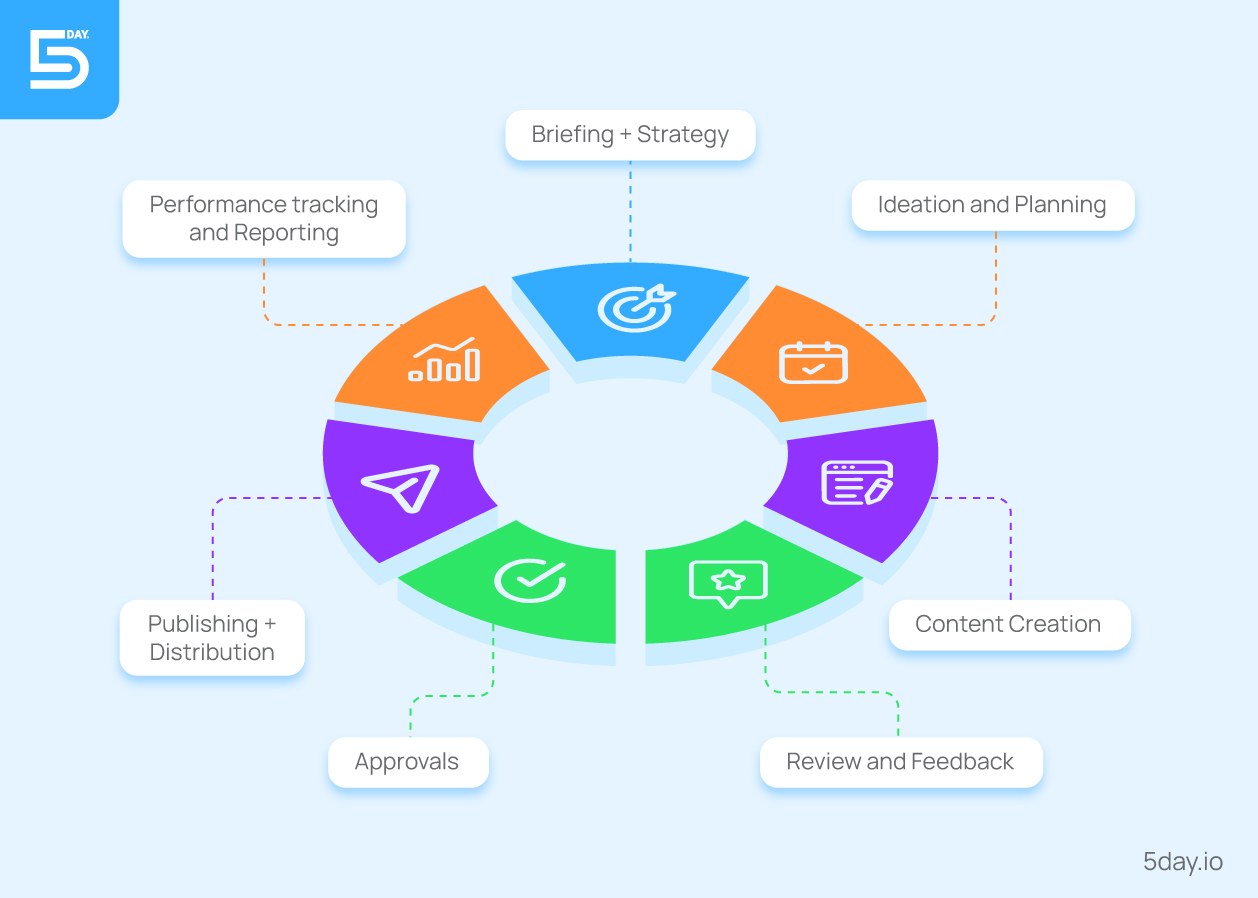
| Stages | Purpose |
| Briefing + Strategy | Define goals, audience, and KPIs |
| Ideation and Planning | Generate ideas, map editorial calendar |
| Content Creation | Produce drafts, design creative assets |
| Review and Feedback | Refine content through iterative feedback |
| Approvals | Secure final client/stakeholder sign-off |
| Publishing + Distribution | Schedule and release across channels |
| Performance tracking and Reporting | Measure results, analyze, share insights |
Brief + strategy
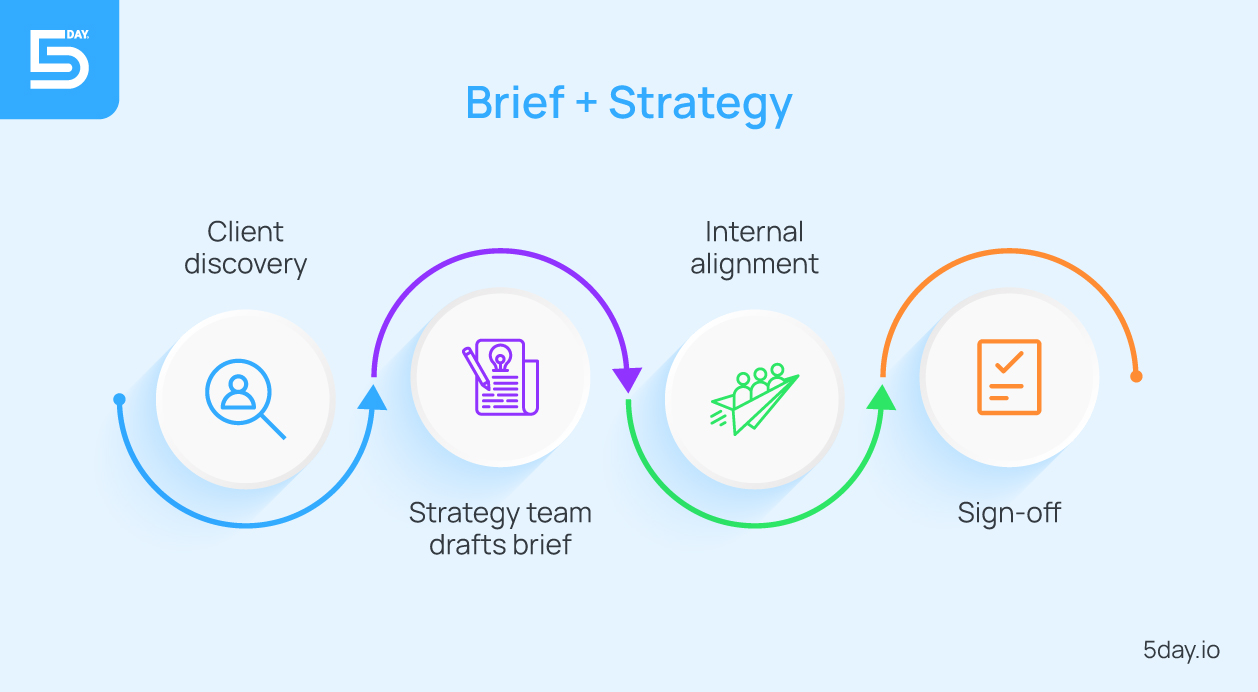
The path to great content begins with the brief. Discovery sessions turn into a strategic brief that aligns the client’s vision with actionable goals here.
A well-executed brief builds clarity and trust. But a poor one with operational challenges can ripple throughout the project which impacts everyone from account managers to the execution team.
Challenges at this stage and its impact:
| Challenge | Impact |
| Information gaps | Repeated clarifications that slow momentum and increase miscommunication |
| Overlapping roles | Duplicated tasks and wasted effort that lead to sour relationships |
| Time overruns | Delays ripple into later stages of creation and publishing |
| Expectation mismatch | Misaligned KPIs that erode client trust |
Ideation and planning
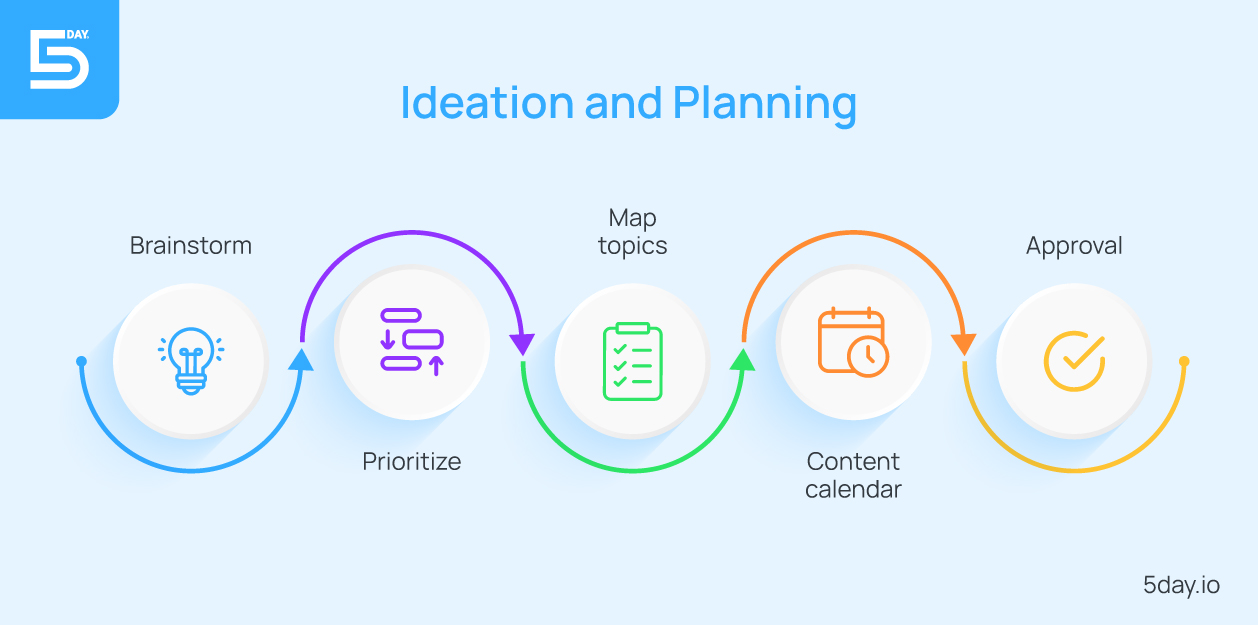
Once goals are set, ideas take shape. This stage is about matching strategic intent into an actionable content roadmap. A solid plan will inspire creativity while keeping execution grounded. However, hinderances at this stage lead to scattered ideas and missed opportunities that impact ROI.
Challenges at this stage and its impact:
| Challenge | Impact |
| Idea fatigue | Content feels repetitive, loses freshness |
| Conflicting priorities | Creative vision clashes with SEO or client goals |
| Lengthy approval loops | Delays calendars and compresses production timelines |
| Resource allocation gaps | Teams are either overbooked with other projects or underutilized |
Content creation
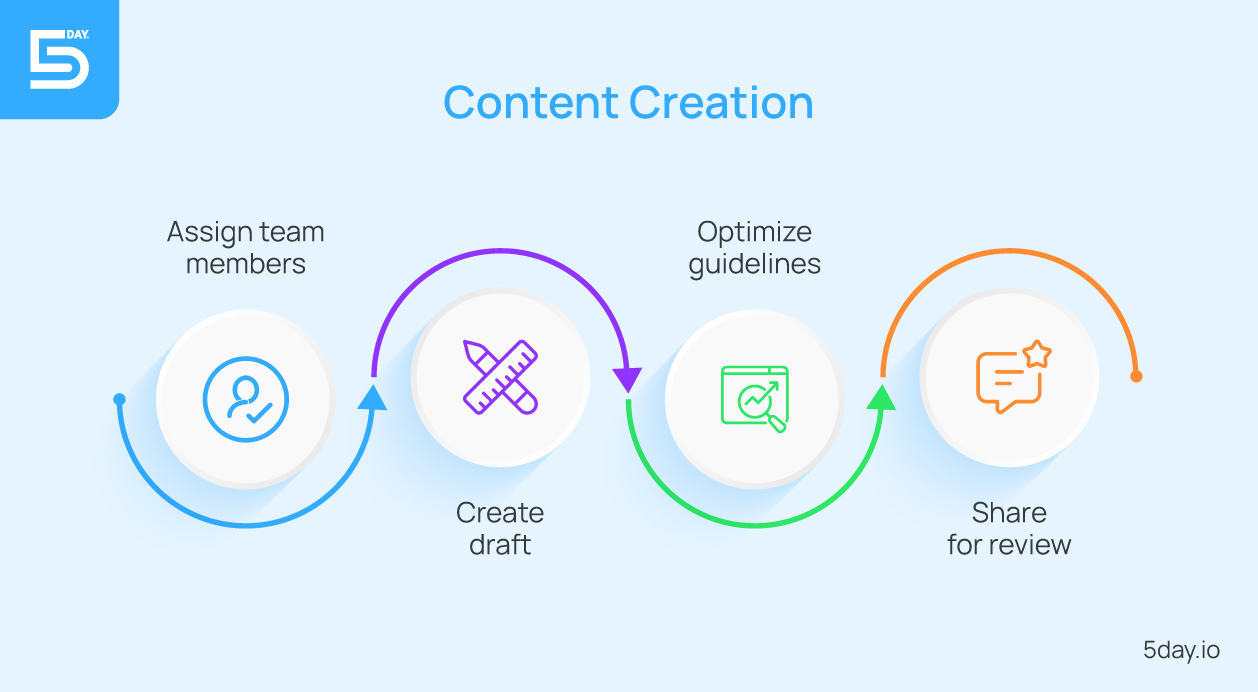
This is where ideas take form. At this stage, the most important aspect is assigning work writers, designers, and other specialists to bring the planned content to life and making sure there is no hinderance in execution.
With a disciplined workflow, creativity doesn’t derail timelines. Additionally, assets meet brand, SEO, editorial, and audience expectations before review.
Challenges at this stage and its impact:
| Challenge | Impact |
| Task handoff delays | Writers/designers wait on each other which slows progress |
| Brand/voice inconsistency | Multiple contributors dilute messaging and tone |
| Scope creep | Extra stakeholder requests expand workload beyond plan |
| SME dependency | Delays occur if subject experts are unavailable |
| Tool fragmentation | Switching platforms causes versioning and collaboration issues |
Review and feedback
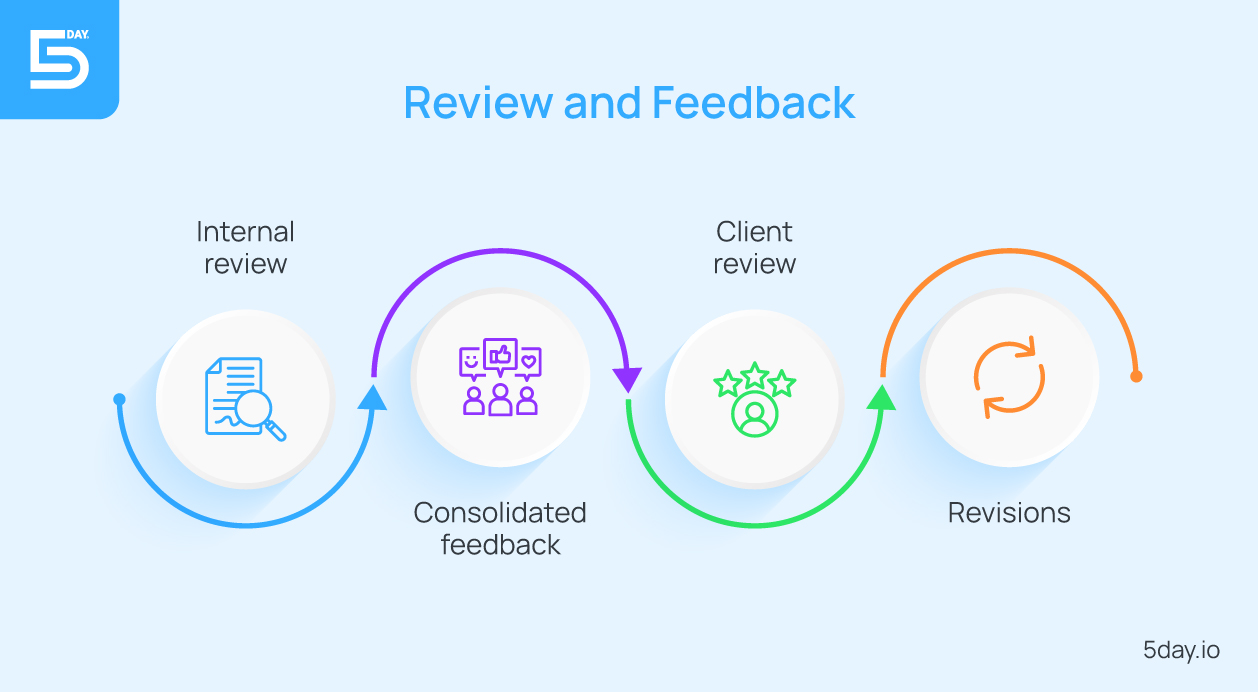
Review is a critical stage in all content where you check the quality and consistency of your content with the brand.
There are multiple challenges at this stage, including breaks in communication, expectations, timelines etc. Let’s look at them and their impact below.
| Challenge | Impact |
| Too many reviewers without hierarchy | Conflicting edits stall decisions |
| Scattered feedback across tools | Version confusion leads to duplicated work |
| Delayed client responses | Compressed timelines end in rushed outputs |
| Unlimited revision cycles | Resource drain, burnout, and budget creep |
| Vague or unclear feedback | Time wasted interpreting and reworking |
| No clear final decision-maker | Endless loops and frustration |
Approvals
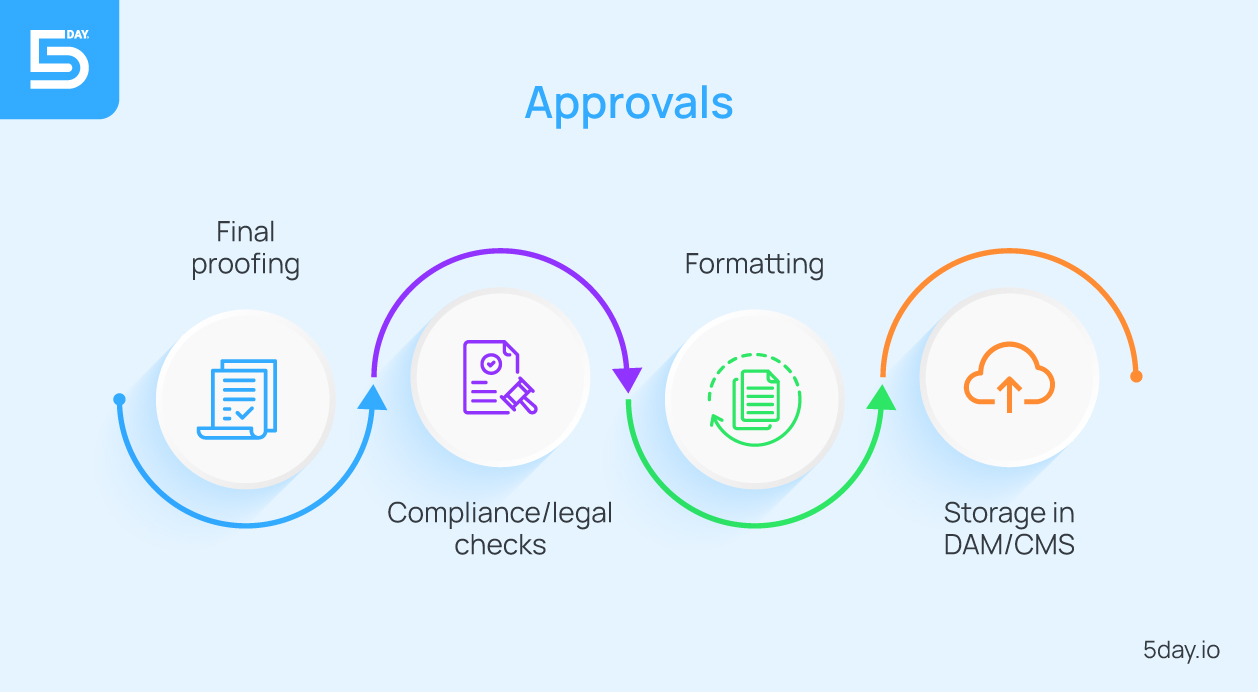
Approval is a critical process before making the campaigns live. Gaps in the process are costly, emotionally as well as financially. Here’s how they show up in your business.
| Challenge | Impact |
| Compliance/legal delays | Creates bottlenecks in regulated industries |
| Last-minute client pivots | Efforts get wasted and |
| Formatting inconsistencies | Errors across platforms, undermining professionalism |
| Poor file management | Lost assets, confusion over final versions |
| Undefined approval authority | Sign-off confusion, conflicting directives |
| Scope changes post-approval | Timeline disruption and increased costs |
Publishing and distribution
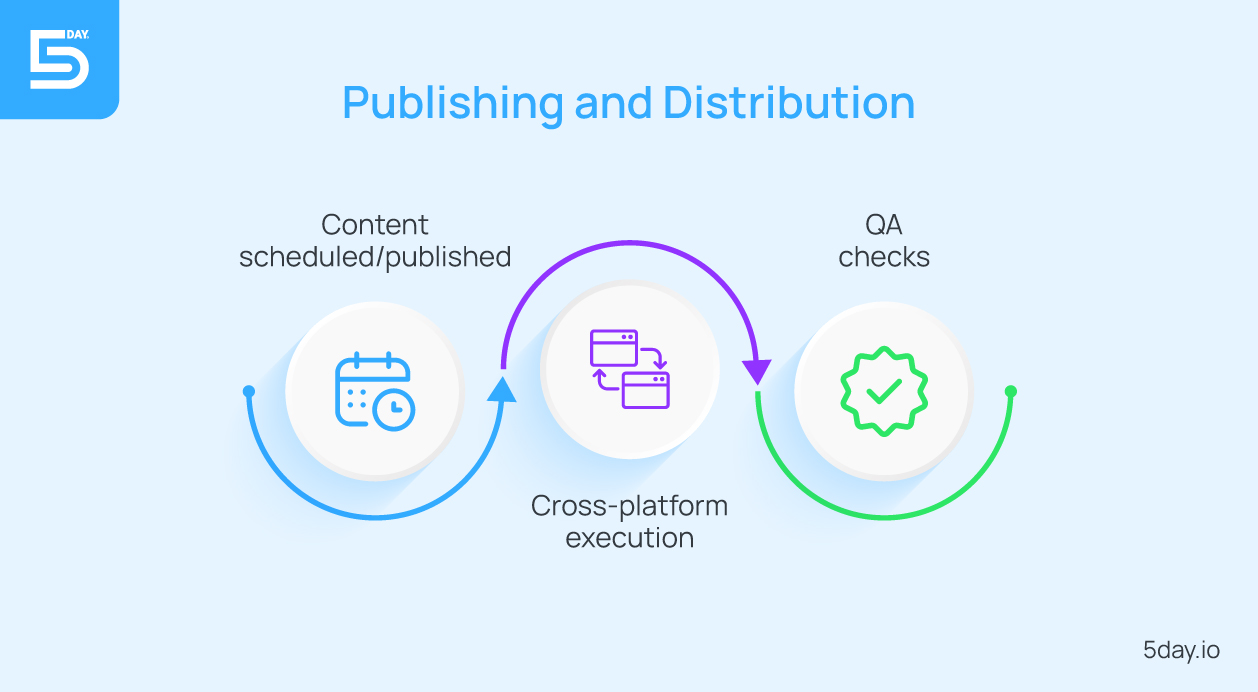
At this point, your planned content meets its audience. Here, the content needs to be scheduled and distributed with precision so that marketing’s hard work actually resonates everywhere it matters.
Challenges on this stage look like:
| Challenge | Impact |
| Fragmented publishing workflow | Teams rely on separate tools which become harder to track and coordinate |
| Lack of publishing ownership | Unclear who “presses publish” → delays and accountability gaps |
| Access dependencies | Waiting on client/platform permissions stalls timelines |
| Manual scheduling | High risk of human error and duplication on multi-channel campaigns |
| Inconsistent QA process | No standardized pre-publish checklist → formatting issues, broken links |
| Poor visibility across teams | Without a publishing tracker, PMs can’t see what’s live vs pending |
| Coordination gaps with campaigns | Overlaps with paid/organic launches reduce impact |
Performance tracking and reporting
![]()
This stage closes the loop by turning data into decisions. It’s where you gather analytics, build reports, and share insights with clients. Done well, this transforms numbers into strategy. But poor execution becomes a mechanical task with little value.
| Challenge | Impact |
| Data silos across tools | SEO, social, and paid data is scattered which leads to manual consolidation and delays |
| Manual reporting processes | They are error-prone and hard to scale |
| Delayed reporting cycles | Insights arrive too late to inform live campaigns |
| Poor optimization loop | Reports get shared but there are no structured follow-up actions |
| Limited dashboard visibility | Teams lack real-time access which creates blind spots in decision-making |
How 5day.io takes your content from brief to publication
Start your campaigns on the right brief
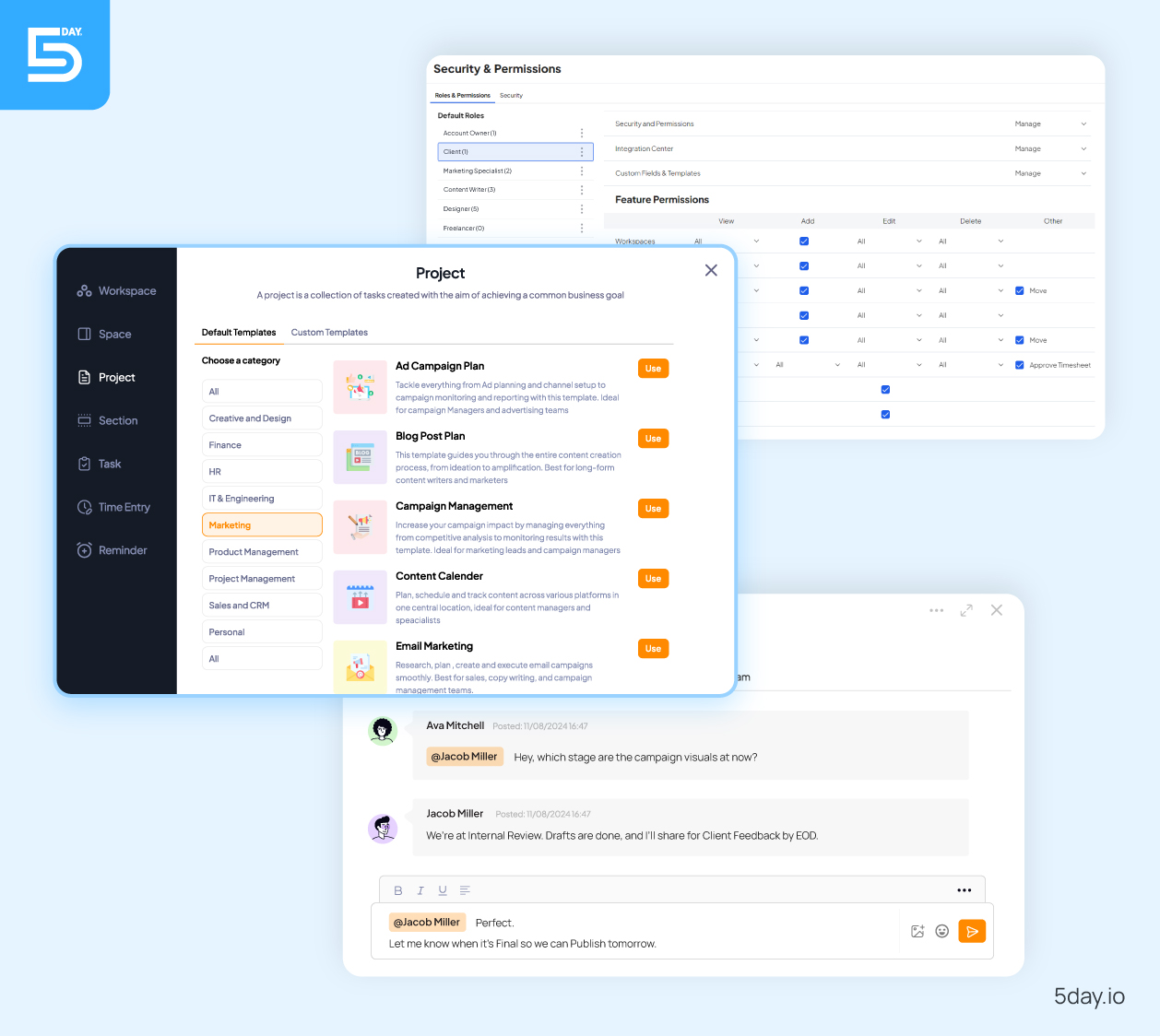
Use custom templates that capture scope, goals, timelines, and success metrics from day one so every project launches with clear direction, unified vision, and total team buy-in.
See the problem and how 5day.io solves it
For every incomplete brief & unclear goal → 5day.io helps you create custom brief templates + centralized project kickoffs
WIN: Capture every detail (scope, KPIs, audience, review timeline) upfront and give the team a clear roadmap from the start.
For every scattered vision across emails/docs → You can create single project for strategy to use project discussions + file attachments
WIN: Align everyone with one source of truth and cut out hunting for the latest brief and client input.
And for every team misalignment at kickoff → Create custom role assignment & defined ownership in 5day.io
WIN: Each member knows their responsibilities and the game plan which reduces confusion and accelerates momentum.
Turn that spark into strategy
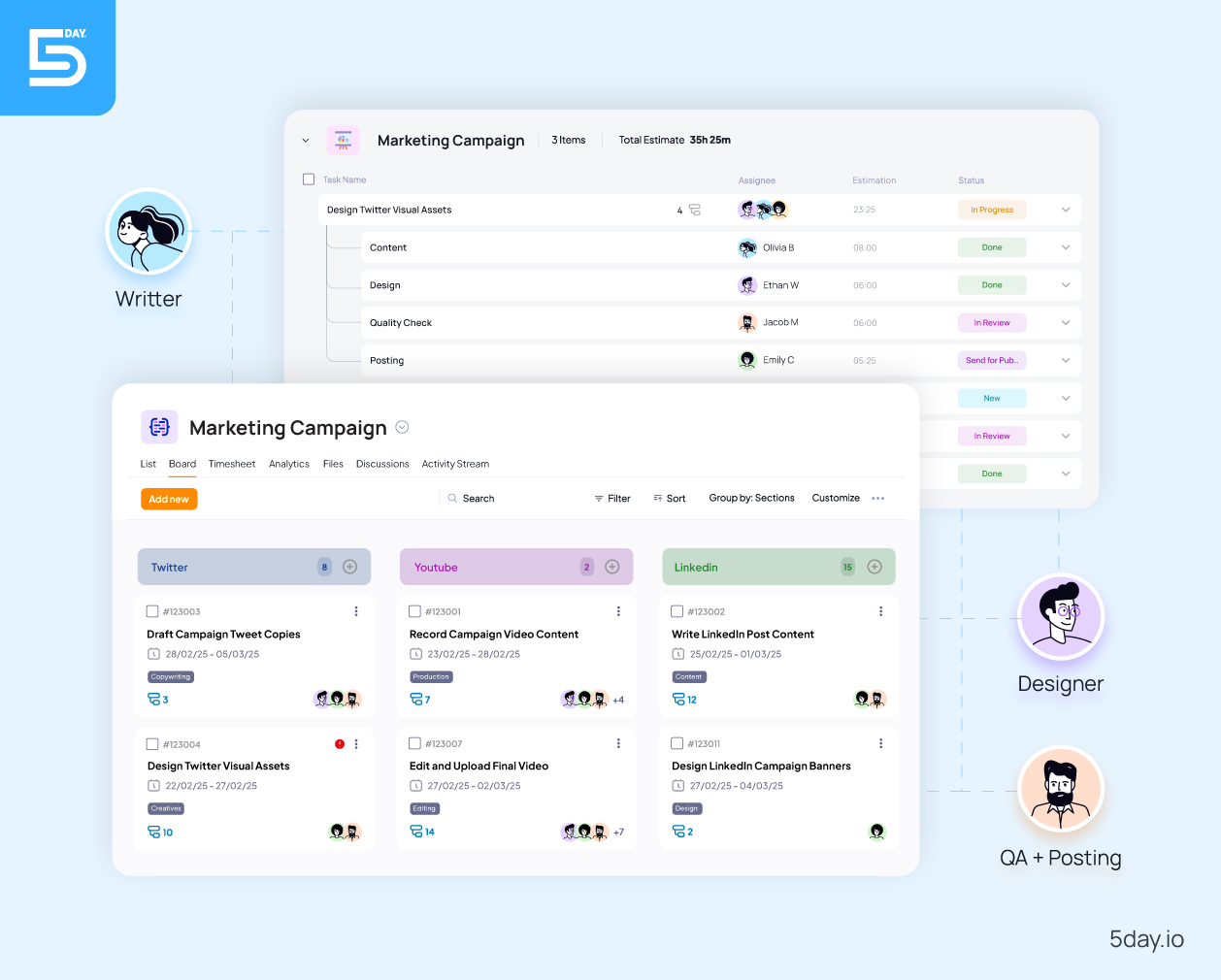
Capture every idea the moment it strikes and organize it by campaign, so no good concept falls through.
Then, map those ideas on a live content calendar tied directly to your campaigns, so every idea is vetted, scheduled, and aligned with strategic goals.
See the problem and how 5day.io solves it
Ideas lost in the shuffle → Idea backlog + tagging by campaign
WIN: Make brainstorms actionable: log every idea, categorize it, and keep it ready for development when needed.
Planning disconnected from execution → Integrated content calendar + task dependencies
WIN: Make dates and deliverables live together so when a launch date shifts, all related tasks can be adjusted easily, preventing last-minute scrambles.
Misaligned teams and priorities → Real-time visibility into plans + role-based assignments
WIN: Have content, design, and strategy teams plan in one place, so everyone sees the same timeline and knows who owns what, eliminating crossed wires.
Execute the strategy with ease
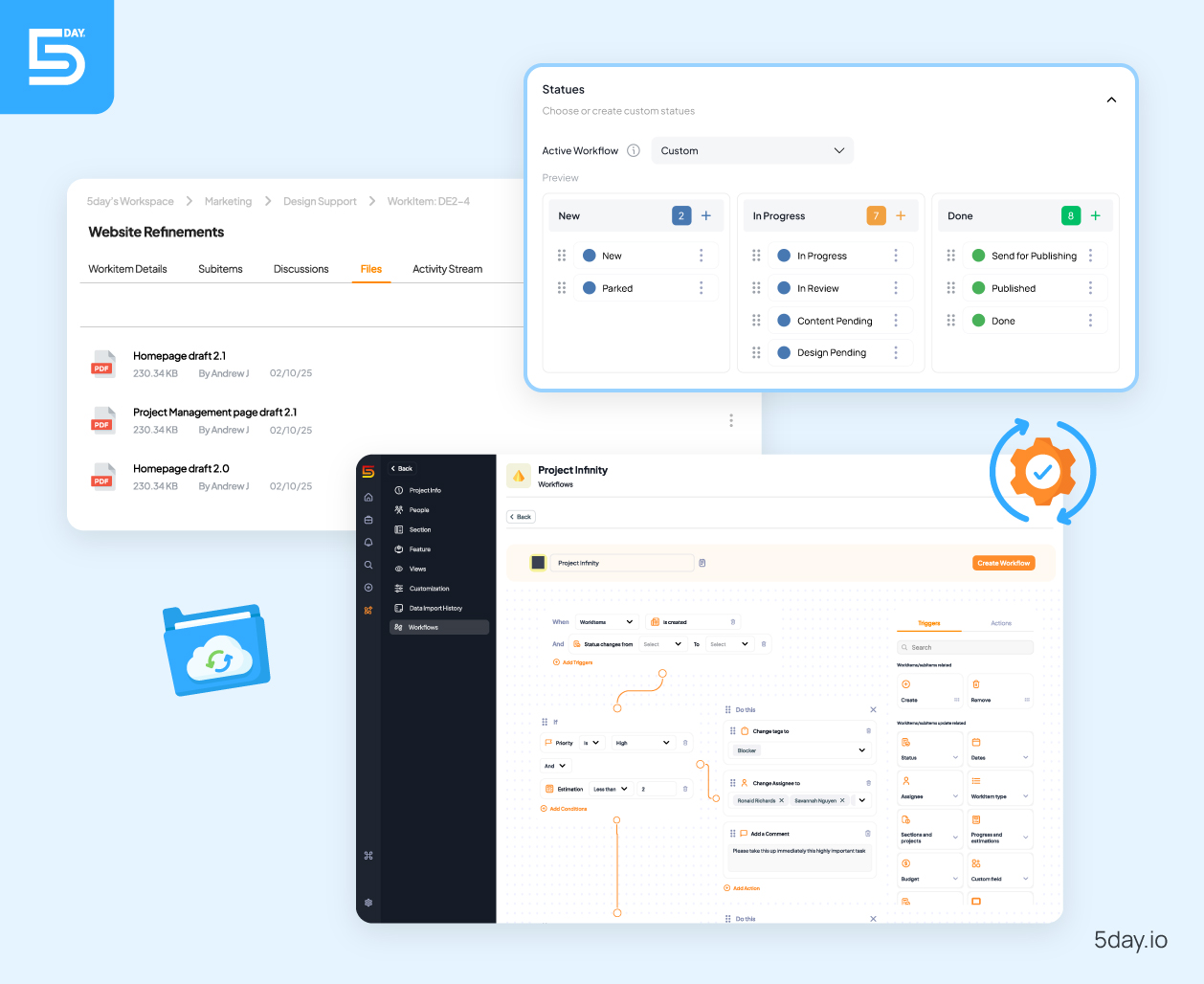
Keep everything creators need at their fingertips to remove any guesswork with 5day.io. Your team can focus on crafting high-quality content faster, with less friction and zero ambiguity about what’s expected.
See the problem and how 5day.io solves it
Creators working with incomplete info → Task-centric files (briefs, assets, style guides, requirements attached)
WIN: No guessing or chasing details because every piece of context lives with the task, so creators can dive straight into work with confidence.
Disjointed drafting process → Custom workflow stages for drafting & editing
WIN: First draft to final copy flows in a defined sequence (e.g., writer → content lead edit → strategist edit), so revisions happen in order and nothing slips through the cracks.
Missed handoffs between teams → Task dependencies + automated updates
WIN: When copy is done, design and video tasks are triggered instantly so there are no “missed messages” surprises and a smooth creation process is followed.
Polish all content to perfection
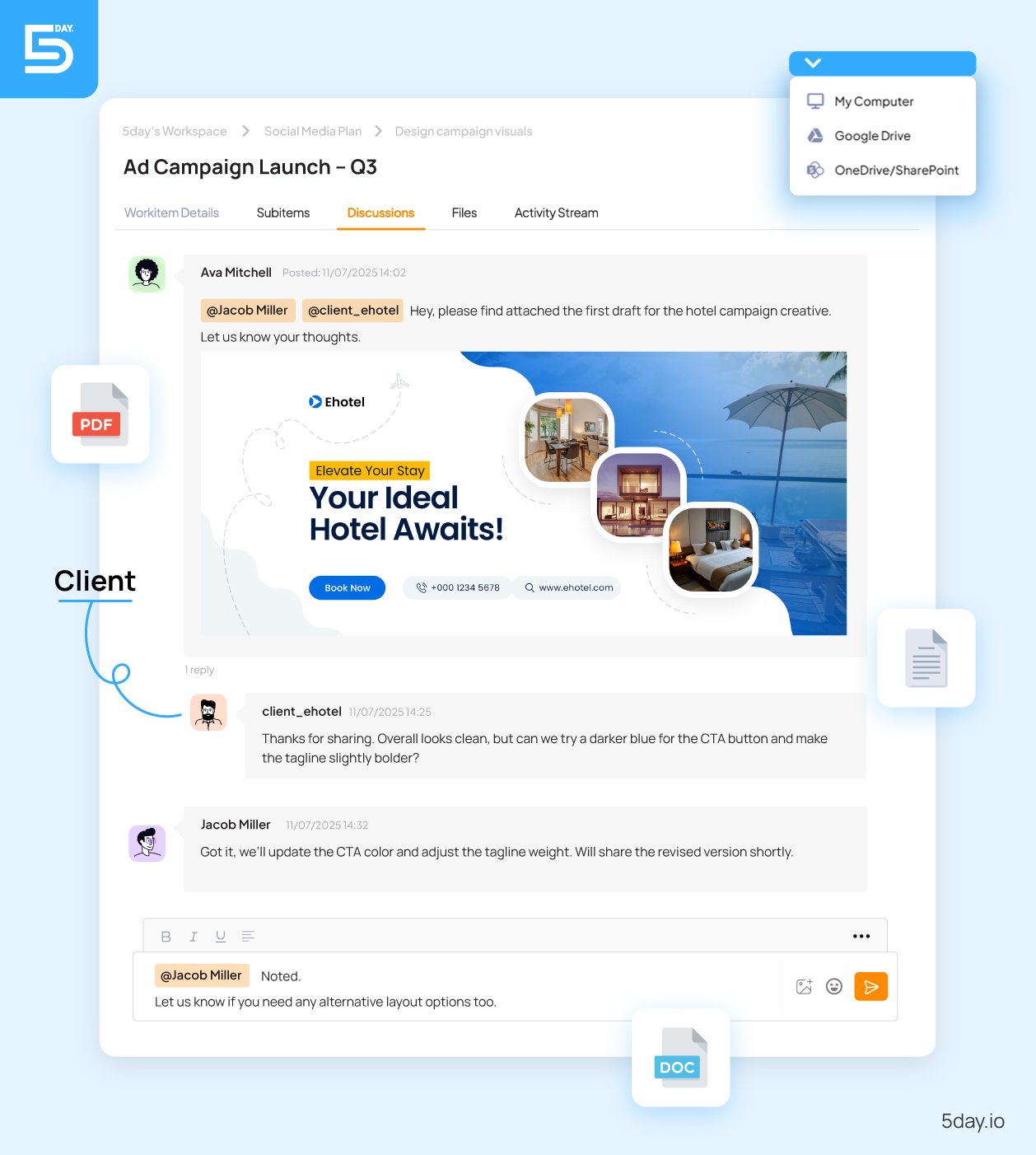
Feedback is the make-or-break point for content quality. Using 5day.io, you can consolidate all feedback in one collaborative space.
See the problem and how 5day.io solves it
Feedback misses & version confusion → Threaded in-app comments + file sync with Google Drive and OneDrive
WIN: Every suggestion and change request is logged alongside the content, with the latest version always at hand, speeding up revisions.
Too many voices and unclear input → Structured review roles + assignees
WIN: Each piece gets the right eyes at the right time (e.g., internal QA before client review), and reviewers follow clear guidelines, so feedback is actionable instead of contradictory.
Client feedback doesn’t reach on time and disrupts workflow → Client-accessible interface with custom roles
WIN: Clients can review and comment in-platform without derailing internal progress. They see just what they need to, ensuring transparency and quick approval while your team stays in control.
Launch your content with impact
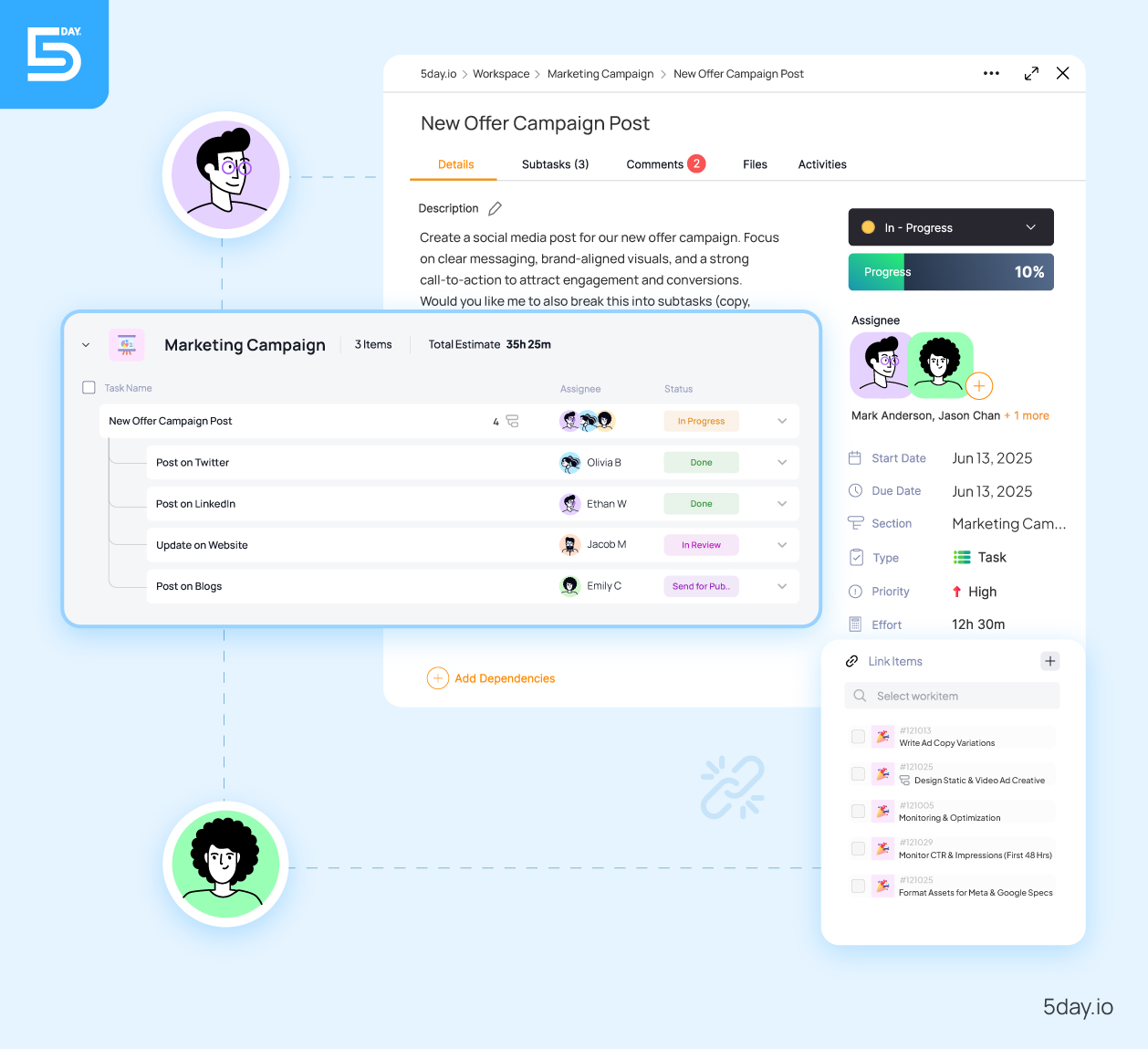
Sync your publishing schedule to your campaign calendar so that every post goes out at the strategically optimal time.
Break down campaigns by channel specifics – a blog, a tweet, an email, each as its own task ready to go live.
Missed deadlines & launch windows → Campaign calendar + publish ready automation triggers
WIN: Publishing isn’t an afterthought with 5day.io. Bake it into the plan from stage 1. You can link content tasks with the campaign schedule, so the content goes live when it makes the most impact.
Unclear hand-offs for posting → Assigned owners for each channel + final launch template
WIN: No confusion at launch time: who posts to Twitter, who updates the website – it’s all predetermined. Every piece has an owner and a templated checklist, so distribution remains coordinated.
Real life impact content teams have observed with 5day.io

Content teams like Cuneiform Consulting that switch to 5day.io have seen measurable results in client satisfaction rates and revenue impact. From fewer missed deadlines to faster approvals, the platform brings discipline, visibility, and calm to every campaign. Here’s the impact their team experienced:
| Impact Area | Results with 5day.io |
| Campaign delivery speed | 40% faster from brief to publish |
| Revision cycles | Cut by 50% on average |
| Communication overhead | Reduced by 60% |
| On-time delivery | 100% deadlines met consistently |
| Reporting time | 80% less time spent |
| Extra capacity | +1 project delivered per quarter |
Experience the impact 5day.io brings to content teams yourself. Try 5day.io today. It’s completely free for 30 days without any credit information.
